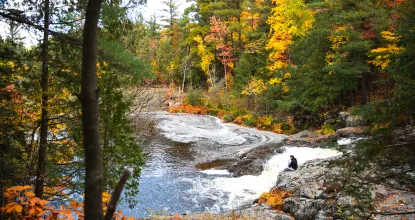November 22, 2024
A year ago NMU’s leadership implemented the Carbon Neutrality Plan for 2050. In the past year, we have seen a 15% reduction in CO2e (carbon dioxide equivalent, a typical measure for combined GHG emissions). In 2010 our CO2e was 46,594 metric tons, then in 2019 (the year used for the baseline of the Carbon Neutrality Plan) our emissions were 32,000 metric tons of CO2e. In 2023 we reduced our campus footprint and improved energy efficiency (especially in lighting and HVAC systems) to reduce our emissions to 27,377 metric tons of CO2e. We’re on track, if not ahead of schedule in meeting our 2030 goal of 25,000 metric tons of CO2e.
NMU’s emission reduction strategy has focused on energy reduction and increased efficiency in campus renovation projects. For example, the physical footprint of the Jacobetti Complex was reduced and the lighting and HVAC systems were updated to improve efficiencies. Similarly, renovations in the Vandament Arena included upgrades to the building's lighting systems and overall infrastructure. This renovation also provided more energy-efficient event scheduling by creating a space for basketball and volleyball to hold games without having to switch over the flooring of the Berry Events Center for every game. With this renovation completed, the Berry Events Center is now exclusively used for hockey events, eliminating the energy demands required to transition the Berry for different sporting events. Additionally, the HVAC and ice-making system at the Berry was replaced and updated this summer reducing energy consumption further.
One of the key targets in the Carbon Neutrality Plan is to replace all lights on campus with LED bulbs. Prior to the development of the carbon neutrality plan, NMU Facilities replaced all of the lighting in the Dome for nearly an 80% savings on electricity. In July 2017, 312 metal halide field light fixtures were replaced with 136 LED fixtures. The energy savings along with the utility company rebate provided for a six-year payback. Learning and benefiting from energy efficiency projects like the Dome, has motivated NMU Facilities to replace fixtures and bulbs across campus. This fall Facilities finished replacing 5,500 fluorescent lights in the Cohodas building with LEDs, and we anticipate a reduction in energy use by more than 30%.
Finally, we have seen major improvements in the diversion of food waste at the Northern Lights Dining (NLD) Hall. Starting the 2024 winter semester, NDL partnered with a local nonprofit, Partridge Creek Compost, in an effort to divert food waste from our local landfill. The Compost Crew works to sort compost from trash and weighs the compost every day. Twice weekly, Partridge Creek Compost (PCC) picks up the pre- and post-consumer compost from NDL. In October, PCC picked up more than 13,000lbs of compost; and NMU has diverted more than 70,000 pounds of food waste from the landfill since the Compost Crew launched last February. The Compost Crew, made up of around 10 students is actively involved in this initiative having great support from NMU Dining Director, Paul Schoonveld who says “this project has been wildly successful so far and this is just the beginning.”
Written by Kolibri Doldrish, SHINE Carbon Neutrality Intern
Categories: carbon neutrality plan , carbon neutrality intern
